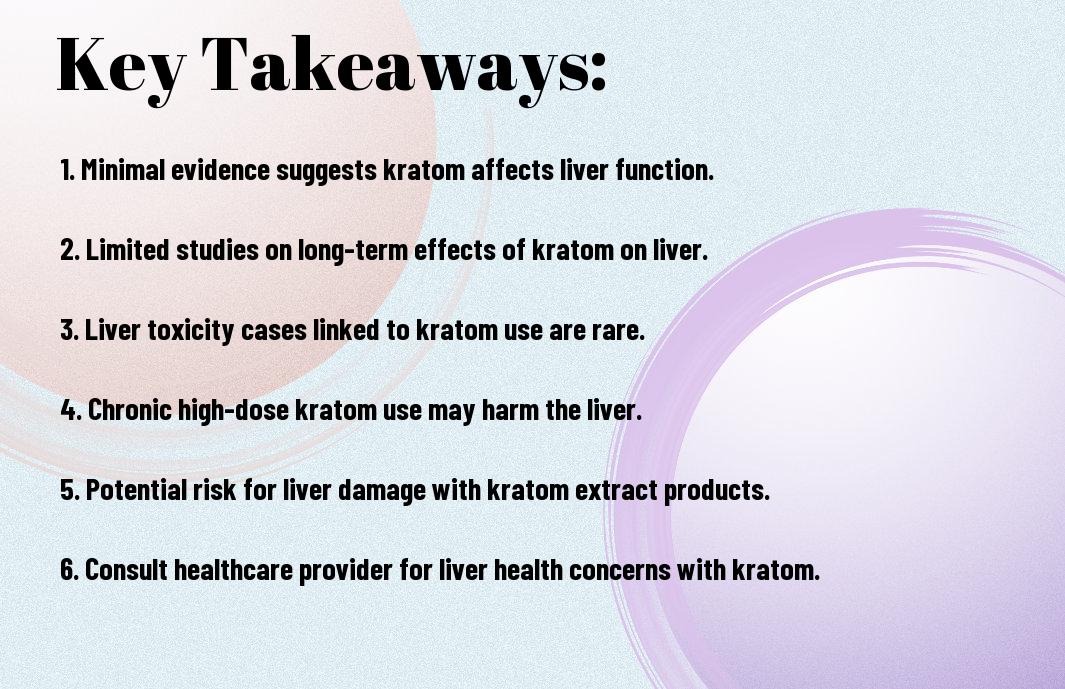Kratom, a popular herbal supplement, has garnered attention for its potential effects on the liver. Understanding the impact of kratom on this vital organ is crucial for users. Dive into the facts about kratom’s relation to liver health and find out the risks involved. For more in-depth information on how kratom affects the liver, check out How Hard Is Kratom On the Liver? Damage And …
Key Takeaways:
- Kratom can have potential liver-related risks: Some studies suggest that kratom consumption can lead to liver toxicity, although the exact mechanisms are still not well understood.
- Monitor liver function with kratom use: Regular monitoring of liver function through blood tests is advisable for individuals using kratom, especially those with pre-existing liver conditions or who are on other medications that may affect the liver.
- Consult with healthcare professionals: It’s crucial for individuals considering or currently using kratom to consult with healthcare providers to assess any potential risks, especially related to liver health, and to ensure safe usage.

What is Kratom?
At the center of the debate surrounding the effects of kratom on the liver is a plant native to Southeast Asia known as Mitragyna speciosa, more commonly referred to as kratom. This tropical evergreen tree has gained popularity in Western countries for its purported uses as a natural remedy for pain, anxiety, and as an alternative to traditional opioids.
Origin and History
Originating from countries like Thailand, Indonesia, and Malaysia, kratom has been used for centuries by indigenous populations in traditional medicine and cultural practices. In its native regions, kratom leaves are often chewed for their stimulant effects or brewed into tea for relaxation and pain relief.
Chemical Composition
It is known that kratom contains a variety of compounds, with the primary active ingredients being mitragynine and 7-hydroxymitragynine. These alkaloids interact with the body’s opioid receptors, producing effects that can vary from stimulation to sedation, depending on the dose.
How Kratom Interacts with the Body
Mechanisms of Action
Kratom interacts with the body through its active compounds, primarily mitragynine and 7-hydroxymitragynine, which bind to opioid receptors in the brain. These alkaloids affect various neurotransmitter systems, including serotonin and dopamine, producing stimulant and analgesic effects. Additionally, kratom’s effects can be mediated through adrenergic, dopaminergic, and serotonergic pathways, contributing to its complex physiological impact.
Effects on the Nervous System
Effects on the nervous system include pain relief, improved mood, and increased energy levels. Kratom’s stimulation of opioid receptors can lead to analgesia and euphoria, similar to traditional opioids but with less risk of respiratory depression. However, long-term use may result in tolerance, dependence, and withdrawal symptoms, highlighting the importance of understanding its impact on the body.
With ongoing research, the effects of kratom on the body’s various systems continue to be explored. By understanding how kratom interacts with the body, we can better evaluate its potential benefits and risks, including its impact on liver function.
The Liver’s Role in Kratom Metabolism
Your How Hard is Kratom on the Liver: Assessing its Impact … liver plays a crucial role in metabolizing substances like kratom. As kratom is ingested, it passes through the liver where it undergoes various metabolic processes before being circulated throughout the body. Understanding how the liver interacts with kratom can provide insights into how it may affect the body.
Liver Function and Detoxification
The liver acts as the body’s primary detoxification center, breaking down substances like kratom into forms that can be easily eliminated. This process helps protect the body from harmful toxins and ensures that only nutrients and imperative compounds are absorbed into the bloodstream.
Enzymes Involved in Kratom Breakdown
Functioning as catalysts, enzymes in the liver play a key role in breaking down kratom into its metabolites. These enzymes, including cytochrome P450, are responsible for metabolizing kratom alkaloids into forms that can be excreted from the body. Understanding how these enzymes interact with kratom can provide insights into how the body processes this substance.
It is crucial to note that variations in enzyme activity can impact how quickly kratom is broken down in the body. Factors such as genetics and overall liver health can influence the efficiency of this process, potentially affecting how kratom affects an individual.
Potential Risks of Kratom to the Liver
Hepatotoxicity and Liver Damage
For individuals considering the use of kratom, it is important to be aware of the potential risks it poses to the liver. Kratom has been linked to cases of hepatotoxicity, which refers to liver toxicity that can result in liver damage. Although the exact mechanisms are not fully understood, studies have shown that prolonged and high-dose consumption of kratom can lead to liver injury.
Reported Cases of Liver Injury
With the increasing popularity of kratom, there have been reported cases of liver injury associated with its use. Individuals have experienced symptoms such as jaundice, abdominal pain, and elevated liver enzymes after consuming kratom products. While not every kratom user may experience liver issues, it is crucial to be cautious and monitor for any signs of liver damage when using this substance.
Potential complications from liver damage caused by kratom can range from mild discomfort to severe conditions requiring medical intervention. It is advisable to consult with a healthcare professional before using kratom, especially for individuals with pre-existing liver conditions or those taking medications that could interact with kratom.
Factors Influencing Kratom’s Impact on the Liver
All factors can play a role in how kratom affects the liver, including the dosage and frequency of use, individual variations in metabolism, and interactions with other substances. Understanding these factors can help individuals make more informed decisions about their kratom consumption.
Dosage and Frequency of Use
Frequency and dosage of kratom consumption are significant factors in its potential impact on the liver. High doses taken frequently may put more stress on the liver than lower, occasional doses. Keeping dosages moderate and spacing out usage can help reduce the risk of liver issues associated with kratom.
Individual Variations in Metabolism
Factors such as genetics, overall health, and any existing liver conditions can influence how an individual’s liver metabolizes kratom. Some people may be more sensitive to kratom and experience liver issues at lower doses, while others may have a higher tolerance. It’s imperative to be aware of these individual differences when using kratom.
Interactions with Other Substances
Kratom may interact with other substances, including prescription medications, alcohol, and illicit drugs, which can impact the liver‘s ability to process kratom effectively. It’s crucial to research potential interactions and consult with a healthcare professional before combining kratom with other substances to avoid negative effects on the liver.

What are the potential effects of kratom on the liver?
There is ongoing research on the potential effects of kratom on the liver. Some studies suggest a potential link between kratom and liver damage. It is important to be cautious and consult with healthcare professionals before using kratom to gauge its potential impact on liver health.
Mitigating Liver Risks when Using Kratom
Not only is it important to understand the potential risks associated with kratom and liver health, but it is also crucial to take steps to mitigate these risks. By following safe dosages, monitoring liver health, and combining kratom with liver-supporting supplements, individuals can help protect their liver while still benefiting from kratom’s effects.
Safe Dosage Guidelines
Mitigating the risks to the liver starts with adhering to safe dosage guidelines when using kratom. Overconsumption of kratom can put a strain on the liver and lead to potential health issues. It is recommended to start with a low dose and gradually increase it as needed, while always staying within the recommended dosage range.
Monitoring Liver Health
The liver plays a crucial role in metabolizing substances like kratom, making it important to monitor its health when using this botanical. Regular check-ups with a healthcare provider and routine liver function tests can help catch any potential issues early on. If any unusual symptoms, such as jaundice or abdominal pain, arise, it is important to seek medical attention promptly.
The liver can be affected by various factors, so staying informed and proactive about liver health is key when incorporating kratom into your wellness routine.
Combining Kratom with Liver-Supporting Supplements
Kratom users can also consider combining their kratom intake with liver-supporting supplements to help maintain liver health. Supplements like milk thistle, N-acetylcysteine (NAC), and turmeric have been studied for their potential benefits in supporting liver function. Consult with a healthcare provider before adding any supplements to your regimen to ensure they are safe and appropriate for you.
To enhance the protective effects on the liver, it’s important to prioritize a healthy lifestyle, which includes a balanced diet, regular exercise, and avoiding harmful substances like excessive alcohol consumption.
By being mindful of these strategies, individuals can enjoy the potential benefits of kratom while taking steps to safeguard their liver health. Bear in mind, always prioritize your overall well-being when incorporating any new substance into your routine.
To wrap up
Hence, it can be concluded that while there is some evidence to suggest that kratom may have potential effects on the liver, more research is needed to fully understand the extent of these effects and the factors that may contribute to them. It is important for individuals considering the use of kratom to consult with a healthcare professional to fully understand the potential risks and benefits associated with its consumption, especially if they have preexisting liver conditions. As with any substance, moderation and caution should be exercised to prioritize one’s health and well-being.
FAQ
Q: What is Kratom?
A: Kratom is a tropical tree native to Southeast Asia, known for its leaves that contain compounds with psychotropic (mind-altering) effects.
Q: How does Kratom affect the liver?
A: Kratom has been linked to cases of liver damage, ranging from elevated liver enzymes to more severe conditions like hepatitis and liver failure.
Q: What causes liver damage from Kratom use?
A: The exact mechanism by which Kratom affects the liver is still not fully understood, but it is believed to be related to the metabolic breakdown of Kratom compounds in the liver.
Q: What are the symptoms of liver damage from Kratom?
A: Symptoms of liver damage from Kratom may include jaundice (yellowing of the skin and eyes), dark urine, fatigue, nausea, and abdominal pain.
Q: Can Kratom be safely consumed without affecting the liver?
A: While more research is needed to fully understand the risks, it is recommended to use Kratom in moderation and avoid combining it with other substances that may stress the liver, such as alcohol or certain medications.









